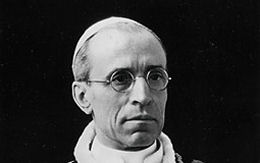 Two Italian researchers have found previously unknown correspondence about a meeting held in November 1944 between Pope Pius XII and the British ambassador to the Holy See, Francis D'Arcy Osborne. According to the papers, kept in the British National Archives in London, Osborne told the Catholic pontiff that the British government wanted him to issue a public appeal on behalf of the 400,000 Hungarian Jews who were being deported to the Nazi death camps at the time. However, Pius said that he was under pressure to condemn alleged abuses perpetrated by the Soviets against Catholic civilians in Poland and in the Baltic countries. Osborne reportedly told the pope that he had seen no evidence that the Russians had committed any such atrocities, and that even if they had, they could not be compared to the mass murder of Jews by the Nazis.
Two Italian researchers have found previously unknown correspondence about a meeting held in November 1944 between Pope Pius XII and the British ambassador to the Holy See, Francis D'Arcy Osborne. According to the papers, kept in the British National Archives in London, Osborne told the Catholic pontiff that the British government wanted him to issue a public appeal on behalf of the 400,000 Hungarian Jews who were being deported to the Nazi death camps at the time. However, Pius said that he was under pressure to condemn alleged abuses perpetrated by the Soviets against Catholic civilians in Poland and in the Baltic countries. Osborne reportedly told the pope that he had seen no evidence that the Russians had committed any such atrocities, and that even if they had, they could not be compared to the mass murder of Jews by the Nazis.
Pius agreed, according to the documents, but said that even if he issued an appeal on behalf of the Jews in Hungary, he would not explicitly criticize the Nazis. Historian Andrea Riccardi was quoted by the ‘Daily Telegraph’ newspaper as saying: "Pius adopted the principle of denouncing the sin but not the sinner, maintaining the careful line that he had adopted up until then.”
Two years earlier, Osborne had written in his diary: "The more I think of it, the more I am revolted by Hitler's massacre of the Jewish race on the one hand, and, on the other, the Vatican's almost exclusive preoccupation with the ... possibilities of the bombardment of Rome.” At the time, the city was occupied by German troops.
Pius' apparently ambiguous attitude towards the persecution of Europe's Jews also emerges from a meeting he had with the United States' diplomatic representative to the Vatican, Harold Tittmann, in October 1943. Pius XII had appeared indifferent to the fate of more than a thousand Jews rounded up in Rome and sent to Auschwitz. Pius XII had shown more concern over reports of "Communist gangs roaming in the environs of Rome", Tittmann said at the time. Cardinal Achille Silvestrini, a former Vatican official in charge of foreign affairs, who as a young priest served in Pope Pius’ private office, said the Pope had believed it would be "counterproductive" to speak out against Nazi atrocities, but dedicated himself to concrete actions.
Silvestrini told ‘La Stampa’ that the pope’s activity on behalf of the Jews would not have been possible should relations with the Germans have grown tense. "In that tragic period, the pope was concerned that the Germans leave Rome in peace, and respect its sacred character," he told the Italian newspaper ‘La Stampa’. “And this was not an option against the Jews. On the contrary. Precisely that attitude of prudence made it possible to act in an effective and concrete manner in favor of the Jews and many others who were persecuted. Every gesture of protest or rebellion with a lot of publicity would have been counterproductive,” the cardinal added.
Meanwhile, Cardinal Fiorenzo Angelini, also a former Vatican official, expressed "great joy" and "satisfaction without limits" at Pope Benedict's recent decision to move Pius XII forward to beatification. Angelini lived through the bombings of Rome as an assistant priest in a Roman parish, and in this position first came into contact with Pope Pius XII. "Among the living and the dead, in the midst of the rubble, that is how I found him for the first time," the cardinal told the Catholic news agency CNA. "I admired immediately the greatness of his character, the greatness of his spirit, of a pastor not only endeared, but tied to the souls of the entire world, but in that moment present to his Roman faithful."
The cardinal explained that he had risked his own life to follow the example set by Pope Pius XII, "hiding Jews, accompanying them in the street" and transporting Jewish possessions by truck to safe places out of the reach of the Germans. He said they were "driven, also moved by his example, by his words" to save the Jews.
The French philosopher Bernard-Henri Lévy, who is Jewish, also defended Pope Pius XII against charges that he did not do enough to save the Jews from the Holocaust. "The whole world was silent about the Shoah, and now people are trying to put the sole responsibility for this silence on the shoulders of [Pius XII] who neither had arms nor airplanes at his disposal...and who managed to save many of those in Rome [from the Nazi onslaught] for whom he bore a moral responsibility," Lévy wrote in the German newspaper 'Frankfurter Allgemeine Zeitung'.
Have your say and email us your view on this news story.





